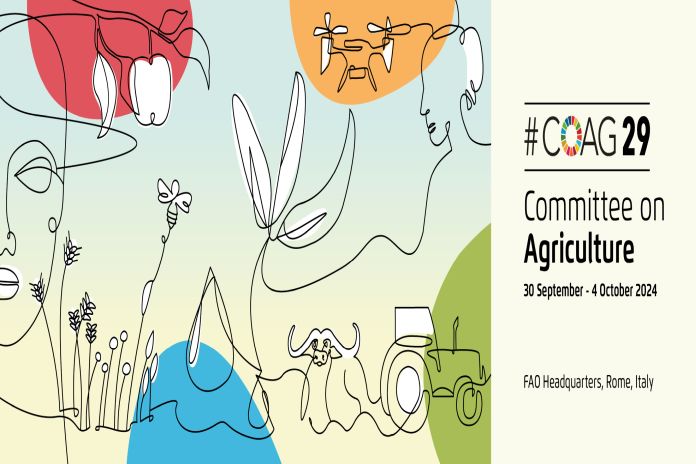-
- Director-General emphasizes the role of sustainable agrifood systems in solving current challenges
ROME – The 29th Session of the Committee on Agriculture (COAG) at the Rome headquarters of the Food and Agriculture Organization of the United Nations (FAO), address the urgent need to transform agrifood systems amid persistently high global hunger figures and mounting challenges.
As a governing body of FAO, COAG provides guidance on agriculture-related policies, reviews global agricultural issues and trends, and advises on emerging topics. Its key roles include providing technical advice on matters related to crops, livestock, food safety, nutrition, rural development, natural resource management and other interconnected issues.
This year’s meeting, held in hybrid form until October 4, is taking place amid severe pressure arising from the increasing impacts of the climate crisis, conflicts and economic downturns. With just six years left to achieve the 2030 Agenda and its Sustainable Development Goals (SDGs), food insecurity around the world remains a major concern. Hunger affected more than 730 million people in 2023, and about 2.8 billion people continued to be unable to afford a healthy diet.
“As we meet today, we are reminded that our agrifood systems are facing huge challenges,” the Director-General said. “But we must also remember that there are huge opportunities ahead of us.”
The director-general recalled his attendance at the recent UN Summit for the Future and the UN General Assembly in New York, where global leaders met to reaffirm our collective commitment to leave no one behind, and to build a better future for all.
The Pact for the Future adopted in New York recognized the critical need to transform global agrifood systems to be more efficient, more inclusive, more resilient, and more sustainable, he said.
At last week’s G7 Meeting of Agriculture Ministers, FAO again emphasized the importance of science and innovation in agriculture to address the impacts of the climate crisis and to produce more with less to ensure we can feed a growing population, while minimizing our environmental footprint, he said.
FAO is also playing an active role in the lead-up to COP29 to ensure that agrifood systems remain central to the discussions, the director-general added.
To support FAO’s transformative approach to agrifood systems, the COAG meeting will over this week discuss and advice on strategic priorities, including the following topics: Livestock; the One Health approach; sustainable management of plastics in agriculture; land and water resources; bioeconomy; agriculture and forestry linkages; the status of women in agrifood systems; nutrition; the climate change, biodiversity and food security nexus; the potential of neglected and underutilized species; as well as the improving the uptake of technologies and innovations for agrifood system transformation.
Related: Preventing global plant health threats with help from across the ocean





